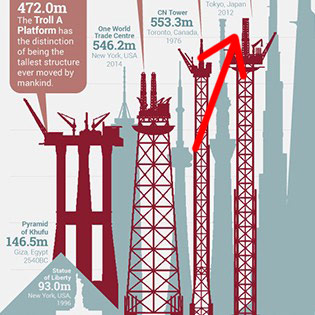by Jamie Walker
Published on May 6th, 2014
Heavy Oil – The Future of the Industry!
In a world where the refining demand is constantly increasing – and we are looking to add new product lines on or building facilities that can handle more demand. Praxis Global Research looks to find ways of identifying the current needs of the industry and marrying them with state of the art-know-how and technology. There is definitely not a shortage of need for upgrading and expanding refineries in Latam.
While the supply of expensive, easy-to-refine light sweet crude peaking in the US, Colombia is finding newer sources of crude which are of lower API, heavy crudes (API less than 20o). Reficar, Refinería de Cartagena S.A. has recognized this growing trend of heavy oil needed to be refined, and is set to finish upgrades later this year to accommodate this demand. Reficar`s expansion is estimated to cost $6.4 billion (U.S.) and will increase the refining capacity of Colombia by about 85,000–90,000 barrels per-day. Thus adding incredible value to Colombia`s hydrocarbon resources and supporting the country by eliminating dependability on fuels imports. Praxis Global Research had a chance to speak with the CEO, Reyes Reinoso, about the expansion:
IN FIGURES:
- Project cost: U$6.467 millions (no contingency included)
- Current refining capacity: 80,000 bpd
- Future refining capacity: 165,000 bpd
- Future exporting capacity: 120,000 bpd
- Heavy-crude oil to refined products conversion rate: 96 percent
What is the importance of this financing deal for Colombia?
Reyes REINOSO: Given the size and complexity of the Cartagena Refinery Expansion Project, it required a considerable amount of resources from the financial market, as well as ample tenors for the repayment of the loans. This challenge became even more critical under the market conditions experienced in the Global economic crisis during 2011. The fact that Reficar obtained financing from three Export Credit Agencies and four world renowned commercial Banks for a total amount of USD 3.5 billion despite of the crisis, reflects their support to the Project and the confidence, the financial community has on the strength of the Colombian economy.
Additionally, this was the first project finance transaction in the country where there was a combination of the public and private sector in the country. The project involved state owned companies, private contractors, governmental credit agencies and private commercial banks. This innovative project finance structure became a landmark for other governmental companies that need to finance large infrastructure projects in Latin America.
How will the Cartagena Refinery compete in regional and global markets?
RR: The Cartagena Refinery is extraordinarily significant for Colombia’s energy mix, as it will turn Colombia into a net exporter of high-value refined products and directly contribute to the development of the oil industry and associated sectors.
The new technologies incorporated in the Cartagena expansion project will also make Colombia much more competitive in the fuels market, due to a significant investment in energy efficiency (lower costs), higher flexibility to adapt to market fluctuations, products quality, and strong reliability and safe operation.
What is the impact of the Project for Colombia´s economy and development?
RR: The construction phase of the project has already positively impacted the economy of city of Cartagena and the Caribbean coast line of Colombia by:
- The creation of two technical training centers for construction jobs such as welders, pipe fitters, carpentry, electricians, etc.
- The incorporation of more than 28,000 new craft labor jobs, during the construction phase.
- Increasing the income level of 82 % of the craft population, in approximately 2 to 4 times.
- Promoting several indirect jobs associated with: transportation, catering, security, hotel services, etc.
Once the expansion project is completed, Colombia´s current energy dependency will cease and will become an exporter of fuel commodities of the highest quality. This important change is bound to be very beneficial for the country’s trade balance.
We also expect The Cartagena Refinery to become a reference in the sustainability model, due to our strong social investment in the region.
What have been the main challenges of this Project?
RR: There have been many technical, logistic, manpower and financial challenges. For instance, the project involved equipment of size and weight that had never before been lifted or transported in Colombia. Local infrastructure limitations presented a significant challenge.
Planning began eighteen months in advance, with increased security and logistical measures being put in place to assure the feasibility of the lifting process.
The second-tallest weight lifting crane in the world, and the largest ever seen in Colombia, with the capacity to pick up 2,500 tons with incredible reach and precision, was brought in for the operation. This crane was used for the placing of three large and heavy vessels in one of the existing units in operation. This was accomplished without any incidents, after an extremely detailed, revised plan. There was also a need to create a “roll-on/roll-off” discharge structure right on the refinery coast line, in order to move extra-large and heavy equipment into the refinery. A major task was to move one of the tallest towers in the refinery (82 meters) which had to be brought in, lifted and place in one piece.
The work force has been the most inspiring of all challenges, and in Reficar we have work very hard to train, offer a truly valuable working experience, and with a very competitive salary to improve their life standard of over 28,000 employees.
For both construction needs and keeping hydrated such a large work force, we built an ice plant of 17 ton of ice a day capacity. We move the work force with over 300 buses with air conditioning every day and food logistics segregated in 13 ventilated mega tents that serve more than 18,000 meals at the time. All this challenges have never been encountered in Colombia before.
ECAs have high environmental requirement. How has Reficar dealt with this?
RR: Reficar’s project was conceived and designed since the beginning, to comply with international environmental standards. This was a success factor which allowed the company to comply with Colombian environmental regulations, obtain all approvals from the environmental authorities on time and have a strong environmental and social management plan for the Cartagena Refinery Expansion Project. The company, with the support of its financial and legal advisors, prepared all the additional information required by the ECAs and was able to comply with all their environmental requirements.
Could the community practices in this project be replicated elsewhere, and how can this be achieved?
RR: The best community practice, and most valuable achievement, in this project was the development of a training center for unskilled workers. The center trained works in 16 different crafts based on the National Center for Construction Education and Research (NCCER) guidelines. A grand total of 5,271 men and women were trained at no expense to them, as carpenters, electricians, welders and riggers and in specialized skills that ranged from pipefitting to sandblasting. The training center was possible thanks to an inter-institutional alliance between a government-run technical school, Reficar and its principal EPC contractor. After applying their knowledge at the Reficar project, workers drastically have improved their probability of finding a good employment elsewhere in Colombia and abroad. This model has been taken into consideration for other projects in the country.
In addition to this effort, Reficar has promoted an outplacement program with the local Chamber of Commerce, in order to facility the workers with some up to date tools to go further with a productive working life either on an independent basis or by finding a new job. The workers willing to participate on the program can choose to be a part of a skilled craft data base for future projects needs with their specific skills and experience or for those with a more developed entrepreneurship spirit, the program named Horizons can provide guidance in design and feasibility to create their own service company.
We are simultaneously contacting all our international and national suppliers of equipment, parts, chemicals, catalysts, instruments and service companies which have been selected during the procurement process, to open a branch in Cartagena´s industrial sector. This will not only create new jobs, but allow us to easily reach these companies for support while extending their possibilities to continue doing business in Colombia. Last but not least, Reficar has just signed with Cartagena´s District office an initiative we hope could be the legacy of our project for the city. We call it our “Project for the city”. After analyzing a recent population census, we have identified the need to prepare a large number of young men and women who will not have an opportunity to get technical education in several areas required by the local industry and future touristic project developments. This social project is of larger scale, so we have invited several local companies from the petrochemical sector, cement, Oil & Gas and we are currently hoping to catch the attention of one or more International Non-Government Organization with social funds to support our dream for Cartagena.
All these initiatives have an important social impact and can be replicated elsewhere, as long as there is a strong leadership willing to promote alliances of the private industry with the public sector. In Reficar we believe, industrial sustainability is directly dependent of true harmony with the society around us.
Did you enjoy this article?




 6 Key Energy Communities You Need to Know
6 Key Energy Communities You Need to Know South Africa - The Rising Star of African Oil and Gas
South Africa - The Rising Star of African Oil and Gas How Tall are the World’s Largest Offshore Oil Structures?
How Tall are the World’s Largest Offshore Oil Structures? Brent Janke, Vice President East Coast, Suncor - Energy Audio Address
Brent Janke, Vice President East Coast, Suncor - Energy Audio Address President Of Shell Canada Ltd.
President Of Shell Canada Ltd.
